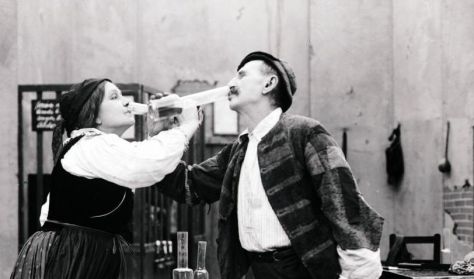
The Exile (A tolonc, 1914) - 120 years of Hungarian cinema / MÜPACINEMA
The discussions before and after the screening will be conducted in Hungarian.

The discussions before and after the screening will be conducted in Hungarian.
Ön egy múltbeli eseményre keresett rá. Kérjük, válogasson aktuális kínálatunkból a Jegy.hu keresőjében!
Last event date: Monday, November 08 2021 7:00PM
The Exile (A tolonc, 1914)
120 years of Hungarian cinema
There are very few Hungarian silent films left to posterity. Even Mihály Kertész's The Exile only found its way back to Hungary from abroad. Which at least means we still have the chance to enjoy the acting skills of the famous Hungarian actress Mari Jászai: it is the only surviving film in which she appears. Though those skills are difficult to judge with a modern eye. Partly because the language of silent film is not the same as that of today, but also because acting in general was also utterly different a century ago. Perhaps that it is why seeing Jászai's dramatic presence leap from the screen is such a special experience.
The Exile is a thrilling, rich spectacle. And it is a genuine film, a folk theatre-influenced piece that is distinguished from the world of stage sets by its spectacular on-location shoots (Cluj-Napoca, Rimetea, Turda Gorge). It creates realistic spaces. At the same time, there can be no denying that the stage is a defining inspiration. The film's producer, Jenő Janovics, was the director of the National Theatre in Cluj-Napoca. It was a particularly ingenious idea on his part to use the potential of theatre to create a silent film in Transylvania. Because in a theatre, not only will you find superb actors, there is also no problem when it comes to producing the scenery, props and costumes. This potential was one of the reasons that directors like Mihály Kertész and Sándor Korda travelled from the Proja film studio to Cluj-Napoca. While we often discuss Hungarian producers that worked in Hollywood, Jenő Janovics, a pioneer of Hungarian film production, rarely gets a mention. Now, here is our chance.
Mind you, it is worth noting that the film did not make it home in good condition. Its restoration and digitalisation required some difficult, painstaking work, as the people involved strived to ensure the film could be as faithful as possible to the original images of 1914 - including the acting scenes. The film score, however, is new. The music, written specifically for the film by Attila Pacsay in 2014, is a perfect match to the moving pictures.
Featuring:
Host: András Réz
Creator:
Director: Mihály Kertész
The Garden of Lights will once again invite visitors to the magical world of a wonderful, cultic fairy tale in the Budapest Füvészkert for the 2025/26 season. The theme of this year's special light and multimedia exhibition is the story of the eternal child Peter Pan.
Több mint 150 éve hódítja meg a közönséget mindenhol a világon ez a francia féltékenységi bohózat, amit a Nemzetibe időről időre visszatérő Silviu Purcărete állít színpadra. Az abszurd és groteszk látásmódjáról is ismert világhírű román rendező elképzelései szerint készülő előadás egyszerre ígérkezik önfeledt vígjátéknak és színházi ínyencségnek.
A Hamupipőke a világ egyik legismertebb története. Már az ókori Egyiptomban felbukkant, de kínai változata is ismert. Számtalan film és…
Halász Judit karácsonyi koncertje a Vígszínházban
item(s) in basket
total:
Time limit has expired. Please, put item(s) in to basket again.